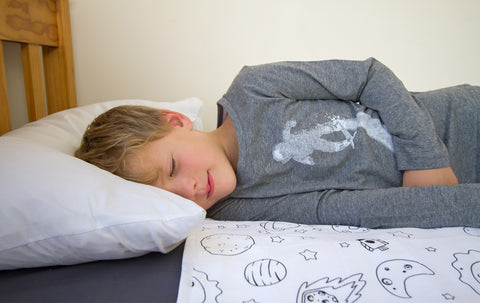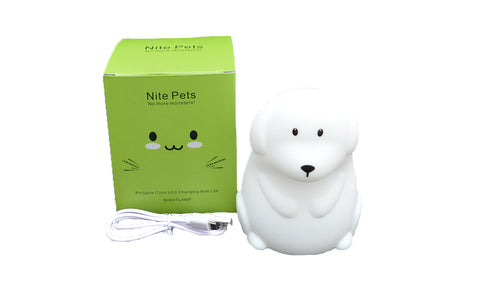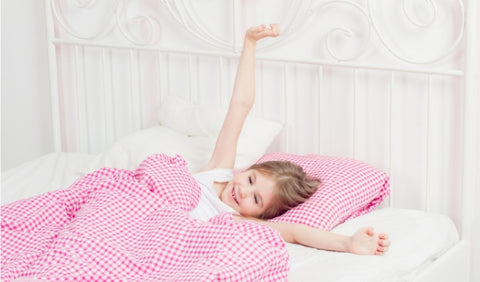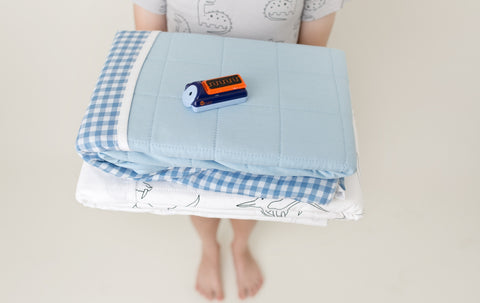Thinking of toilet training? Wondering how to start?
Wetting the bed is something most kids go through and lasts until they are either able to “last all night” and not have to get up to wee or being able to wake themselves up when they need to go.
Remember, it’s not a competition. The age your child becomes dry and how fast it happens is nothing to do with your child or your parenting skills. It can be the size of their bladder, how deeply they sleep, or medical. Did you know if you or your partner wet till older, then your child is also likely to take longer. Yep – genetics also play a part.
Signs of readiness:
1. Is your child waking up dry several mornings a week?
2. Are they a very heavy sleeper? If they are wet every morning and a very heavy sleeper, you may need to look into an alarm.
3. If they wake up wet, check the wee to see if it is warm. Are they weeing just before they wake up, or even when awake?
4. Is your child wanting to try?
One - Prepare your child and their bed.
Bottom line – there is going to be extra laundry and you will need to get up in the night. So is the time right for you and your child? Don’t start just before the new baby is due or a week or so before school starts.
Some kids think the nappy comes off and they will wake up dry. It is easier to set expectations that are realistic and explain there may be accidents and it may take some time to achieve. Talk about how common it is and something everyone goes through. Get some Brolly Sheet bed pads to lighten your laundry load. Brolly Sheets are an easy to change bed pad that protects your mattress. They are waterproof, have a unique 100% soft cotton top and only takes seconds to change at 2 am. The different colours and patterns make it easy to get your child’s “buy in”. Explain to your child Brolly Sheets look cool but are made to be weed on. It’s no big deal and will mean everyone gets back to sleep faster. Make sure their pyjamas are easy to pull up and down.
Two – set a bed time routine
A good routine at night will help. If your child is very tired, it will be harder for their brain to trigger the signal they need to wake up and wee. Before bed, ensure your child goes to the toilet and does a “decent wee”. Some kids rush through this part. It is a good idea to sit down whilst your child is on the toilet and explain how his bladder is like a plastic bag and he needs to empty “this bag” before bed. Get them to take their time. It is also a good idea to remind them if they wake in the night and feel the need to wee – to get up and go.
Three – limits drinks
If your child is drinking plenty during the day they should not need a lot of extra drinks in the evening. The trick here is to make sure they are drinking plenty during the day. If you are unsure what they do at school, have a big drink with breakfast and when they get home. Plus you can make a game of how many drink bottles they can drink at school . If they do want a big drink before bed, explain what you are both trying to achieve and that what goes in must come out. Plus stay away from caffeinated drinks as caffeine is a diuretic which means you have to pee more often. Now is the time to drop the bottle if your child still has one before bed. Limit drinks from dinner time. If your child is drinking plenty during the day, they should not need a lot in the evening.
Four – Light the way
A night light is great for two reasons. If your child does wake and go to the toilet, they can see where they are going. Sometimes we take things for granted like walking around in a dark house at night. A night light makes the house not such a scary place in the dark. Our night lights can unplug and so you child can walk with them to the toilet. It can give some extra comfort. A night light also means if you need to get up and change the bed, you don’t need to use the brighter ceiling light. Hopefully you can change the bed and your child’s pjs quickly and not even have to fully wake up.
Five - Have realistic expectations.
Unlike day time dryness, children have very little control over their bladder when they sleep. A class with 30 kids that are 5 years old, will have 5 or more kids on average that wet the bed at least twice a week. A reward chart may help, but remember, wetting the bed is out of their control. So, you can reward things like going to the toilet before they go to bed, changing their own pyjamas whilst you change the bed, limiting drinks etc. Rewards need to be in your child’s control. If your child becomes anxious or frustrated, put training on hold for a while and come back to it. It is no problem at all to hit the reset button and start again when the time is better.
Products to help
Brolly Sheets

Night Lights

Bed Wetting Alarms










